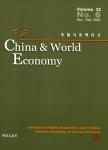Does the Belt and Road Initiative Promote Bilateral Political Relations?
带和道路行动支持双边的政治关系吗?作者机构:School of International Trade and EconomicsUniversity of International Business and Economics(UIBE)China Department of EconomicsThe Chinese University of Hong KongChina Department of Political ScienceUniversity of ArkansasUSA
出 版 物:《China & World Economy》 (中国与世界经济(英文版))
年 卷 期:2021年第29卷第5期
页 面:57-83页
核心收录:
学科分类:07[理学] 0701[理学-数学] 070101[理学-基础数学]
基 金:This research was supported by the National Natural Science Foundation of China(Nos.72073025 and 71873031) the Program for Excellent Talents,UIBE(No.20JQ02)
主 题:BRI international economic cooperation political relations
摘 要:This paper examines the role of the Belt and Road Initiative (BRI) in enhancing political relations between China and its partner countries. We postulate that an international economic cooperation scheme such as the BRI may facilitate commercial exchanges and increase the participating countries’ economic gains. This should generate incentives for these countries to avoid political tensions that may jeopardize mutually beneficial economic exchanges, and to expand the constellation of domestic coalitions in support of cordial diplomatic and political relations. We test the effect of the BRI on bilateral political relations using data on political relations between China and 91 countries along the BRI route between 2006 and 2018. Treating the promulgation of the BRI in 2013 as a policy shock, our difference-in-difference analysis lends substantial support to our hypotheses. Further analyses of the underlying causal mechanisms suggest that the BRI bolsters political relations by strengthening economic ties with partner countries through trade and investment related to economic cooperation.



